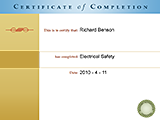Oil Spill Clean Up Response 3: Countermeasures on Water
- Product ID
- efgroscw_vod
- Training Time ?
- 30 to 45 minutes
- Language(s)
- English
- Video Format
- Standard Definition Wide
- Required Plugins
- None
- Number of Lessons
- 11
- Quiz Questions
- 15
- Question Feedback
- Wrong Answer Remediation
- Lesson Bookmarking
- Downloadable Resources



Learn online - Oil Spill Clean Up and Response on Water
An oil spill doesn't need to reach the proportions of the Exxon Valdez to demand a serious and professional response. Countermeasures on Water, the third of a five part training series on Oil Spill Response, training focuses on countermeasures taken in the water. This oil spill response training video identifies the factors that challenge responders to water spills, including weather, wind, sea conditions, and currents. Also included are important resources for enlisting aid; how to track oil spills to predict ecological impact; and how to manage response efforts. Learners concentrate on countermeasures, including booms and barriers, skimming, herding, absorbents, in situ burning, chemical treatment (dispersants and gelling agents), and bioremediation. These oil spill clean up and response training programs, created with the assistance of the US Coast Guard, provides important health and safety information for clean-up workers; and provide information consistent with OSHA and USCG regulations.
Video-On-Demand (VOD): Classroom full-screen presentation or individual play.
![]() This course is in the Video On Demand format, to read about Video On Demand features click here.
This course is in the Video On Demand format, to read about Video On Demand features click here.

- Install on any SCORM LMS
- Full-screen video presentation
- Print certificate and wallet card
- You have 30 days to complete the course
Emergency oil spill responders who are called upon to control and clean up oil spills.
- Introduction
- Oil and Water Properties
- Tracking & Command
- Booms & Barriers
- Skimmers
- Herding and Sorbents
- Chemical Treatment
- In Situ Burning
- Contaminated Wildlife
- Small Boat Use and Temperature Stress
- Summary
- Understand the factors that challenge responders to water spills.
- Recognize how oil weathers when spilled on water.
- Be aware of resources for enlisting aid.
- Track spills to predict ecological impact.
- Manage the response effort.
- Utilize countermeasures for oil spills on water.
- Use necessary safety precautions.
- Properly deal with contaminated wildlife.
© Mastery Technologies, Inc.




